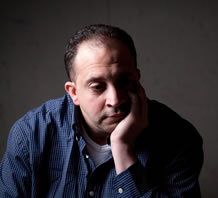Panic Attacks At Night...
Panic attacks at night are also known as nocturnal panic attacks. Night time panic attacks can be sudden and traumatic, so it is important to understand why they occur. On this page you'll learn specifically what causes you to suffer panic attacks at night, the process behind it, the cycle which keeps it running and perhaps most importantly what you need to do in order to recover as quickly and comfortably as possible.
If you've already done your research and are at the stage where you're ready to get help, our page on Panic Attack Treatment will be helpful in understanding what to do next. If you'd prefer to speak to a Consultant about your particular case, have your questions answered and discuss your recovery options, you can call us on 01782 855585, 11am to 9pm, seven days a week.
Why Would I have A Panic Attack Whilst I was Asleep?

Many people struggle to understand why they'd have a panic attack at night whilst they were asleep. They may rationalise that when asleep they 'feel relaxed' and there's nothing going on which could trigger a panic attack... so why does it happen?
The truth is that we don't switch off when we're asleep - we simply shift our conscious awareness. Thus your mind continues to operate 'behind the scenes' even though you may not be aware of it at the time.
The main reason we need sleep isn't actually to rest our body physically - we need sleep primarily to reprocess information. If you've ever worked late or tried to pay attention to something when you feel particularly tired, you'll be aware that your ability to concentrate diminishes rapidly. It become more and more difficult to focus, understand and rationalise the more tired you become. The reason for this is simple - your brain is full and needs to clear itself by reprocessing (archiving) the information you have recently absorbed. Until that information has been reprocessed the functionality of your brain and ability to concentrate will remain 'clogged'. Essentially this is why we need sleep. It allows us to reprocess information in order to free up storage space in the brain.
Let us examine the step by step process of how this works as it will help you to understand how and why you suffer with panic attacks at night.
Let's say it is Tuesday evening at 11pm and you've just got into bed ready to go to sleep. It is probable that you have not slept between when you woke up this morning (7am) and now (11pm). This means that all the information you have gathered today between 7am and 11pm needs to be reprocessed by your brain - basically filed away to make room for tomorrows information. Whilst you sleep tonight that information will be reprocessed.
However, the brain is a little more complex than that as it has the perspective of 'time' to consider as well as connecting important things together. In order to take these things into account, it would seem that the brain reprocesses information several times over several nights, cross-referencing information generally over the previous rolling three days. So when you sleep on Tuesday night you reprocess information from Tuesday, Monday and Sunday cross-referencing and ordering important things accordingly. This also gives your memories a perspective of history and how far back certain events occurred.
Thus you now understand the mechanic's of why we need the sleep and what happens in terms of reprocessing information. Now let us consider how panic attacks come into the equation.
Why Do Panic Attacks Happen At Night?

Basically panic attacks are a safety mechanism triggered by the brain when it feels its sensitive neural pathways are under threat of damage. The damage could potentially arise from excessive amounts of stress and anxiety being stored, so rather then the brain sitting back and allowing damage to take place it 'vents' pent up emotion in a rapid purge. This is what you label a panic attack.
The reason panic attacks are very 'physical' is because the venting process causes large amounts of hormones such as adrenaline to be released into the body - hence the pounding heart, difficulty breathing and urge to escape, etc. For more specific information on what panic attacks are and why they occur be sure to look at our pages on: What Is A Panic Attack and additionally What Causes Panic Attacks.
When a sufferers brain decides they have overstepped the line and threat has been detected - the purging process is started. This doesn't mean you'll have a panic attack there and then - it simply doesn't work that way. It can be a matter of hours or even days before the actual physical panic attack manifests. Thus you could overstep the danger line at 2pm on a Thursday and have a panic attack at 3pm on the same day or it may not manifest until 4am on Saturday morning when you are asleep. Thus there is no direct relationship between suffering a panic attack at night and when the venting process is triggered. There could be hours or days between the two.
This unpredictable delay often causes sufferers to incorrectly assume a particular place, situation or event (present at the start of the physical panic attack) must somehow be responsible for causing the panic attack. Based upon incorrect assumptions many sufferers then attempt to avoid certain places, people and situations believing this will somehow prevent a subsequent panic attack.
It is important to remember that stress and anxiety are driven by thought process - not by outside events such as locations like supermarkets, events like traffic congestion or situations like money troubles. For example as you read this text you are almost certainly reasonably safe in terms of reality and thus have no reason (in reality) to be anxious or stressed. However, if you start dwelling upon having a panic attack tonight and all the terror it entails - its easy to start feeling anxious even though the panic attack isn't actually happening in reality.

This is because your emotional centre responds to 'thought process' as though those thoughts are happening in reality, right here, right now. Thus speculating about things you don't want to happen is almost as bad (emotionally speaking) as though they were happening. Remember that a typical panic attack is over in a matter of minutes - however, sufferers can clock up many tens of hours of dwelling, anxiety and worry between attacks.
Now, let's say you have a dwelling session about suffering a panic attack tonight in your sleep. First that raises your stress and anxiety levels right here, right now, which moves you closer to the safety line, which in turn puts you closer to having a real panic attack rather than an imagined one. Second, when you do sleep tonight your dwelling session along with all the associated stress and anxiety is reprocessed for a second time, which will push you even closer to the safety line (and may actually be enough to push you over it). If that's not bad enough, you'll reprocess the same thoughts, anxiety and stress for a third and fourth time over the following two nights when you sleep - each time adding to your stress and anxiety and pushing you closer and closer to a real panic attack. It's not much of a strategy in terms of serving you is it?
You may like to think that we're either making this up or it's just some sort of weak academic theory. However, let's take a look at how your dreams work, because they are essentially examples of you reprocessing information. Have you ever had a bad dream and woken up with a jump, breathless and soaked in sweat? In reality you're safe in bed and there is no real threat or danger. However, your brain and body have responded to your dream as though it was real and happening right here, right now. This is why you respond emotionally (feeling scared) and physically (being soaked in sweat). The only thing that is going on to trigger these responses is the reprocessing of information. Thus when we agree that processing information when you are awake causes an anxious response - what makes you think it'll be any different when you reprocess the same information when you are asleep?
Is it any wonder you're suffering with panic attacks? It's time to understand the panic attack cycle so many sufferers get trapped in and learn how you can break free.
Panic Attacks At Night - Understanding The Cycle...

Many anxiety sufferers complain that they either have broken sleep patterns or that if they do sleep through, they don't feel well rested. If you consider what we've discussed so far then this is hardly surprising. Doing 'anxiety' in the day, reprocessing 'anxiety' again at night and then reprocessing the same anxious information for a second and third night is hardly conducive to good sleep.
The real problem however, is how this process creates a cycle. Basically, when you're tired (because you haven't slept well) it is tough to think straight. When you can't think straight it is common to compensate by attempting to over-analyse things. If you already feel you have things to worry about then these are the things you tend to over-analyse. People often believe they over-analyse and dwell because they are trying to find a solution or rationalise a problem. However, this is not a helpful strategy as going over and over something in your head doesn't change it! Unfortunately, as we discussed earlier, the brain treats all thought process as though it is real and happening right here right now. Thus the more a person dwells and over-analyses a problem or fear... the more their brain treats it as REAL in terms of accumulated stress and anxiety.
If for example you fear having panic attacks at night and spend a couple of hours a day dwelling on what 'might happen' - your brain is accumulating stress and anxiety as though it has actually happened (over and over) in line with your thought processes. The more you dwell the more uptight you feel. The more uptight you get, the worse you sleep. The worse you sleep the tougher it is to think straight. The tougher it is to think straight, the more you compensate by over-analysing and dwelling. Each cycle brings you more anxiety and pushes you steadily closer to another real panic attack. When you have the panic attack (to vent the excessive anxiety levels you have created) you use that as motivation to pursue the cycle with even more vigor.
Nobody is blaming you because up until now it is unlikely you even realised how this worked. Anxiety and panic attacks are not things people take on through choice. However, once you do understand how this works and you realise the cycle is reliant upon your ongoing compliance in doing certain things in a certain way over and over - it becomes your responsibility.
If you want the panic attacks to stop - the cycle has to stop. We've spent seventeen years successfully helping our clients to overcome panic attacks and we are very good at what we do. What you need to decide is whether you're going to spend the rest of your life trapped in a self-perpetuating panic attack cycle - or whether you're going to recover and get your life back.
If you'd like to find out more about our fast treatment programme you should look at this page now: Panic Attack Treatment
If you'd like to know more about us, how we work, how long treatment typically takes, our very reasonable fees, our zero-risk guarantee and what options are open to you - choose from the following:
I live in or near to Stoke on Trent and would like information on Face To Face Consultations at the Anxiety Clinic.
I can't feasibly travel to Stoke on Trent so information on Telephone / Online Consultations would be best for me.
Alternatively, if you'd like to speak to a Consultant (without any pressure or obligation) we'd be pleased to answer your questions and discuss your options. You can contact us on 01782 855585, 11am to 9pm, seven days a week.




